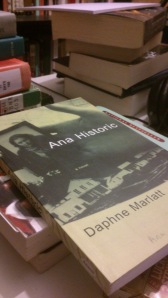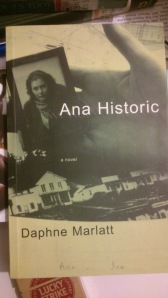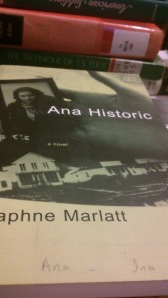ISBN 0-88784-590-8
 I am not sure how to approach this rather short review so excuse me if I digress. It appears that in the last two decades a certain kind of philosophy has turned into “theory”, and many of its adherents seem to believe that within “theory”, philosophy’s rules no longer apply. Mentioning “gender”, “class” or “race” is quite enough, or dropping the name of enough canonized theorists. Thus, essays that do “theory”, often resemble lists of books and writers, containing barely a shred of actual argument. This is not restricted to any kind of theory, it can happen in a deconstructive reading of Dickinson as well as in that unbearable book on Merrill by Gwiazda. When non sequiturs become the main structural principle of an academic work you know you’re in trouble. The only thing that matters in such books or essays is the amount of texts mentioned and the degree to which they fit that book’s idea of “theory”. I have read a review of a biographical study of Elizabeth Bishop where the reviewer’s main complaint is that a passage in the book in question is plausible but “undertheorized”. Huh. I bet it’s also badly argued since the point is tough to argue (the necessity of biographical readings for understanding Bishop’s work) but that’s beside the point.
I am not sure how to approach this rather short review so excuse me if I digress. It appears that in the last two decades a certain kind of philosophy has turned into “theory”, and many of its adherents seem to believe that within “theory”, philosophy’s rules no longer apply. Mentioning “gender”, “class” or “race” is quite enough, or dropping the name of enough canonized theorists. Thus, essays that do “theory”, often resemble lists of books and writers, containing barely a shred of actual argument. This is not restricted to any kind of theory, it can happen in a deconstructive reading of Dickinson as well as in that unbearable book on Merrill by Gwiazda. When non sequiturs become the main structural principle of an academic work you know you’re in trouble. The only thing that matters in such books or essays is the amount of texts mentioned and the degree to which they fit that book’s idea of “theory”. I have read a review of a biographical study of Elizabeth Bishop where the reviewer’s main complaint is that a passage in the book in question is plausible but “undertheorized”. Huh. I bet it’s also badly argued since the point is tough to argue (the necessity of biographical readings for understanding Bishop’s work) but that’s beside the point.
To return to the novel at hand. It has been praised quite a lot but if you look at the blurbs on the back, you can just imagine the reviews. “Theory” reviews of a “theory” novel. For this is what “Ana Historic” is. The writer is clearly well versed in theory of all stripes. Narrative, gender, power. It never drops the requisite names, but otherwise it’s like a big checklist and most readers will have all the right bells ringing in their heads (Foucault! Butler! Etc.). Often complex novels will make readers think of theory, some writers seem to be eerily conscious of the philosophical implications of what they write. The complexity of Beckett’s or Melville’s prose, Merrill’s poetry etc. will make reader’s minds reach for the thinkstuff. Then there are the less subtle writers, the most brilliant of whom is probably Heiner Müller, who write after or during the advent of theory and whose every scene or line betrays that knowledge. But it’s still exciting, interesting, which is more than I can say about Marlatt. Marlatt will, from time to time, stop and insert blunt pieces of theory, explicitly pointing out some presuppositions in the narrative as the gender roles or power structures. At times this reader had the impression of reading an analysis of a text that never appears on its own. This would have been interesting as well.
 However, Marlatt is devoted to be a spoilsport. After doing some analysis she lapses into ‘regular’ writing again, interspersed with some tedious poetry (Marlatt must be an awful poet, if this text is any indication) and, less and less often, “theory”. She is not a good stylist, her prose is flat and uninteresting, sometimes I even had the impression of it’s being intentionally dull. Her being a spoilsport can be demonstrated by opening the book at random but this passage is among the most telling. IT starts out well enough:
However, Marlatt is devoted to be a spoilsport. After doing some analysis she lapses into ‘regular’ writing again, interspersed with some tedious poetry (Marlatt must be an awful poet, if this text is any indication) and, less and less often, “theory”. She is not a good stylist, her prose is flat and uninteresting, sometimes I even had the impression of it’s being intentionally dull. Her being a spoilsport can be demonstrated by opening the book at random but this passage is among the most telling. IT starts out well enough:
not, not…all these elements knotted into the text.
The reader may sigh with slight annoyance, but more often he will chuckle with goodwill. Everybody likes puns. But how does she continue?
not, not…all these elements knotted into the text. silent k. for what? kiss. xoxoxo in code. kisses and hugs. omitted.
See what I mean? Sometimes this book appears to be committed to make this book as straightforward and uninteresting as possible, sussing out every ambiguity or pun and uncurling it. And from beginning to end it’s always the same dull style. And this despite a really good plot.
It’s a book about a woman in our time reimagining the life of a woman in 1873 who is mentioned in brief in some official records. Her notes and imaginings reflect on the way that those who write determine who is remembered and whose story is told and that the circumstances and the society around you determine who writes and who doesn’t. It’s about the power of naming things and people and about the lack of personal choice one has in a society. The book turns out to be a meditation on the limits of writing and thinking as a woman in this culture and language that is still dominated by men and their structures. It is about repression and about discipline, today and then. About questions of power and how they’re interlaced with questions of sexuality. And it does all these things, it bears repeating, in the dullest way imaginable, although, near the end, ten or twenty pages really moved me (the end, again, is awful, awful.).
 There is a basic difficulty in judging a book like this. It is based on the difficulty of being a woman in a patriarchal society and a female writer writing in a patriarchal language, and I, a white male, am bound to misread it. The axiomatic canon I use in judging this book may be wrong and not applicable to “Ana Historic”. But then, the question is, what sort of system is it that Marlatt is submitting her book to. If it’s theory/philosophy, it’s not well argued and not original at all, there is not a shred of originality in the whole book, apart from the research plot and the plot is not part of the system. Or is it literature, then the flat writing and the terrible boredom is an important and damaging issue. I have, however, intimated that Marlatt may be an intentional bore. Make people think not like the book, maybe Brecht all over? I get the feeling Marlatt is trying to somehow straddle both systems and is relying on her poetical muscle to make it all work, since she was, when the novel was first published, a noted and acclaimed poet. Also, Marlatt, as many current practitioners of so-called “theory”, seems to believe that you only have to say enough of the ‘right’ things and say them often enough, to make her text work.Sadly, it doesn’t work, none of this. This plot deserves a better writer or a better thinker. It is not well served with Daphne Marlatt.
There is a basic difficulty in judging a book like this. It is based on the difficulty of being a woman in a patriarchal society and a female writer writing in a patriarchal language, and I, a white male, am bound to misread it. The axiomatic canon I use in judging this book may be wrong and not applicable to “Ana Historic”. But then, the question is, what sort of system is it that Marlatt is submitting her book to. If it’s theory/philosophy, it’s not well argued and not original at all, there is not a shred of originality in the whole book, apart from the research plot and the plot is not part of the system. Or is it literature, then the flat writing and the terrible boredom is an important and damaging issue. I have, however, intimated that Marlatt may be an intentional bore. Make people think not like the book, maybe Brecht all over? I get the feeling Marlatt is trying to somehow straddle both systems and is relying on her poetical muscle to make it all work, since she was, when the novel was first published, a noted and acclaimed poet. Also, Marlatt, as many current practitioners of so-called “theory”, seems to believe that you only have to say enough of the ‘right’ things and say them often enough, to make her text work.Sadly, it doesn’t work, none of this. This plot deserves a better writer or a better thinker. It is not well served with Daphne Marlatt.
*
As always, if you feel like supporting this blog, there is a “Donate” button on the left and this link RIGHT HERE. 🙂 If you liked this, tell me. If you hated it, even better. Send me comments, requests or suggestions either below or via email (cf. my About page) or to mytwitter.)
